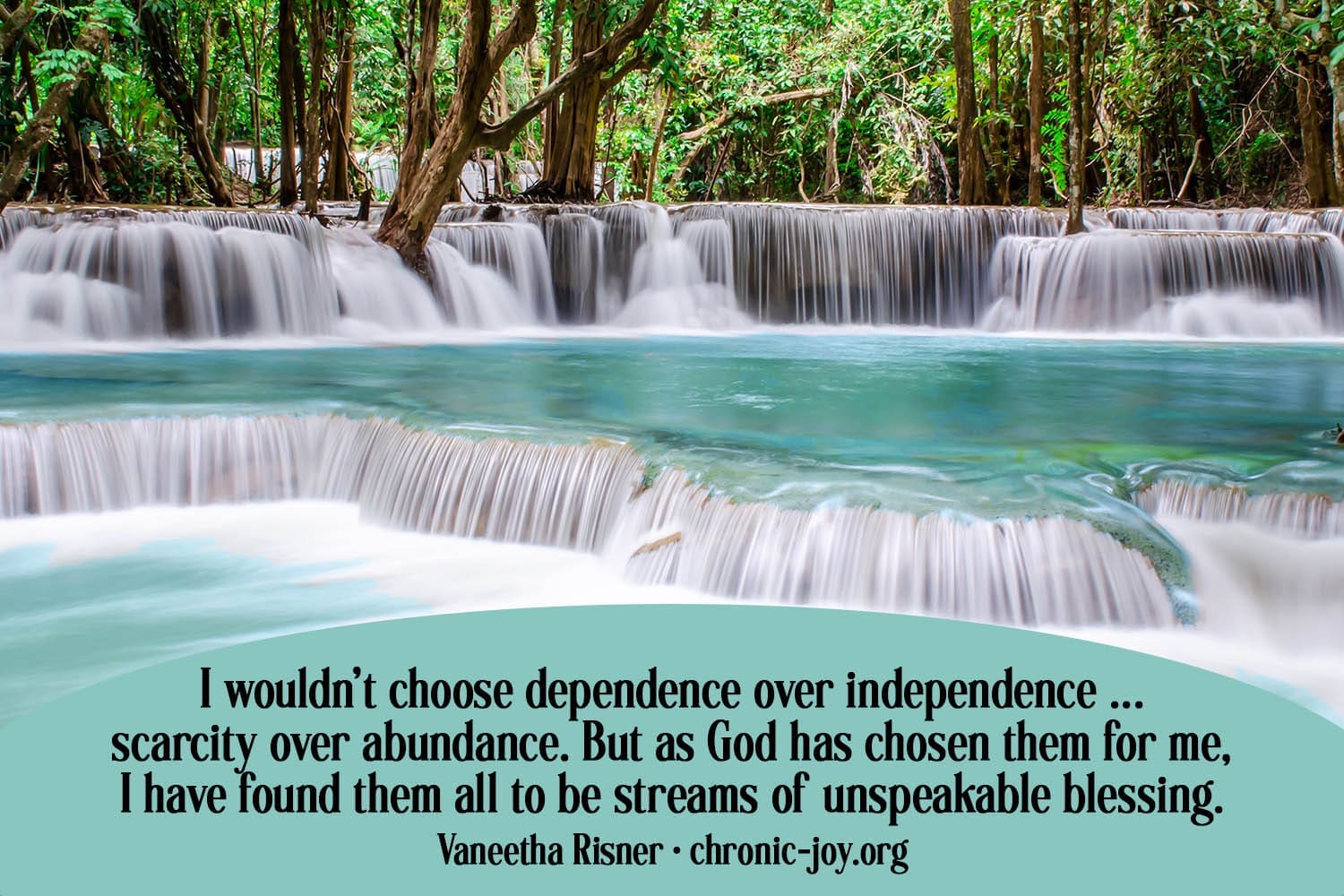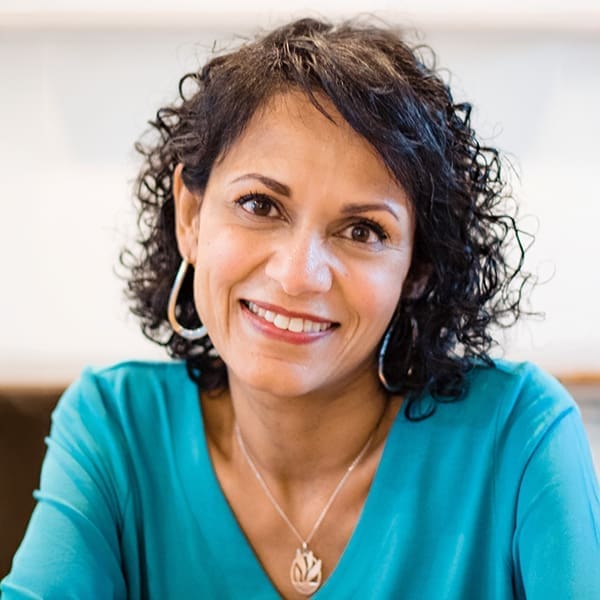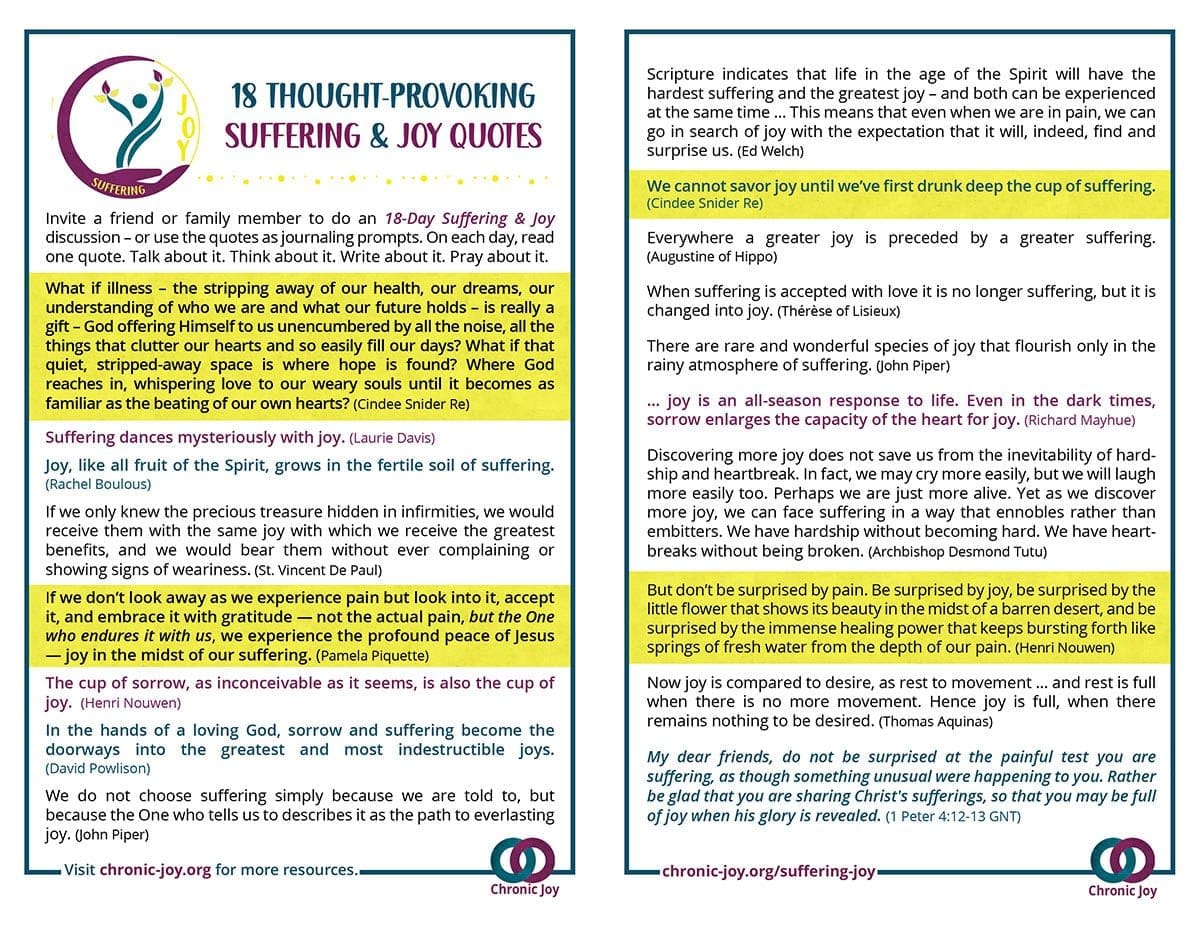
I wouldn’t choose dependence over independence. I wouldn’t choose scarcity over abundance. But as God has chosen them for me, I have found them all to be streams of unspeakable blessing. (Vaneetha Risner)
SELF-SUFFICIENCY AND INDEPENDENCE
Self-sufficiency and independence are part of the American way.
Most of us have embraced these ideals. They allow us to provide for ourselves with little uncertainty and little inconvenience.
We’re all prone to viewing our Maker as a good back-up plan. We work to craft and control our future without help, knowing God is always there if things go awry.
GOODBYE AUTONOMY, HELLO DEPENDENCE
I was operating quite well on that principle until about 15 years ago, when a diagnosis of post-polio syndrome abruptly ended my romance with autonomy. Since then my life has been characterized by dependence: dependence on friends, dependence on family, dependence on God.
Each year I’m able to do less for myself. Each year I must rely on others more.
With post-polio, my muscles will eventually stop working; they cannot be rejuvenated. They are slowly dying. Since I have no idea how much strength I have left, I must trust God to provide the energy I need each day.
My condition is both frustrating and frightening. It’s hard to decide where to direct my waning energy, to figure out what good things I must say “no” to because they’re too costly physically.
PRAYING FOR JUST ENOUGH
As a result, several friends started praying my strength would be like the widow of Zarephath’s oil and flour. That there would always be enough. That I would never lack. That my energy would never expire.
We read the story of the widow of Zarephath in 1 Kings 17. Each day she was given just enough oil and flour for her needs, but no more. And she never knew if she’d have what she needed for the next day. She simply knew that if the Lord didn’t provide for her each day, she and her son would starve. She had no resources of her own, no cushion to fall back on, no way to see the future. But this widow had God. And He was enough.
Her story is a beautiful picture of utter dependence on God. It’s a beautiful example of how God provides for us. A beautiful illustration of trusting Him for our daily needs. Beautiful, that is, for other people. I love watching God work in others’ lives that way. It inspires me. But I don’t want such absolute dependence myself. I wouldn’t willingly choose to be like the widow of Zarephath.
BUT I WANT A FULL FLASK
I don’t like living with scarcity. I don’t like having just enough to meet my needs. I don’t like being dependent. It makes me feel vulnerable. In my economy, I want a full oil flask and overflowing flour jar. I want to see exactly how and when God will provide for my needs. I want a guarantee I can independently verify.
That’s because deep down I’d rather depend on myself than on God. Though I want to serve Him with my whole heart, trusting Him in the dark can be frightening; it’s far easier when the future looks bright. I’d rather praise God for His abundant provision than daily depend on Him to meet my basic needs.
Thankfully, He doesn’t give me what I want or would choose on my own. He has something more magnificent in mind. He knows my security and confidence must be rooted in Him, not in the good things He gives. Even though His gifts may be wonderful blessings, they cannot be my source of hope.
It’s wise to save money so we have enough to retire. But facing retirement with little savings may force us to depend on God in ways a large bank account never would. It’s wonderful to have great health and boundless energy. But being ill and relying on others for assistance may drive us to our knees, quicker and longer, each day. It’s a joy to have a house full of loving, obedient children. But crying out to God because of infertility or wayward kids may draw us into a deeper relationship with Him.
BETTER TO HAVE A TROUBLE
“There is no greater mercy that I know of on earth than good health except it be sickness; and that has often been a greater mercy to me than health,” Charles Spurgeon said. “It is a good thing to be without a trouble; but it is a better thing to have a trouble, and know how to get grace enough to bear it.[i]”
It is a better thing to have a trouble, and know how to get grace enough to bear it. That’s because dependence is always better than self-sufficiency in the kingdom of God. Self-sufficiency leads to pride and selfishness; dependence to humility and intimacy with the Lord. It yields good fruit in our lives. As Spurgeon said elsewhere: “I have learned to kiss the wave that throws me against the Rock of Ages.”
Anything that makes me dependent on God is a good thing, the best thing perhaps. This is, of course, profoundly Biblical. The children of Israel were given manna every day. They couldn’t provide for themselves; they had to depend on their all-providing God. Jesus underscored the importance of day-by-day dependence when He taught us to pray, saying, “Give us this day our daily bread.” Matthew 6:11 God alone provides all we need each day, even our very breath. Any sense of independence from Him, then, is an illusion.
DASHED AGAINST THE ROCK OF AGES
Because of my sinfulness, I still wouldn’t choose to be like the widow of Zarephath. I wouldn’t choose dependence over independence. I wouldn’t choose scarcity over abundance. But as God has chosen them for me, I have found them all to be streams of unspeakable blessing.
I am thankful the Lord continues to give me what is best for me, not what I would choose for myself. I am consumed with my own comfort; He is consumed with my eternal joy. My places of famine and desolation have become the places where I see Him most clearly. Not only does He meet my every need, He wondrously fills me with Himself.
And, miraculously, I am learning to be grateful for every wave that dashes me against the Rock of Ages.
[i] C.H. Spurgeon, The Simplicity and Sublimity of Salvation, delivered June 5, 1892.
*Chapter 18 of The Scars That Have Shaped Me: How God Meets Us in Suffering


Vaneetha Risner
Author
Vaneetha writes and speaks about meeting God in suffering. She is the author of The Scars That Have Shaped Me, Walking Through Fire, Desperate for Hope (a Bible study), and Watching for the Morning: 90 Devotionals When Hope Is Hard to Find (coming soon). You can find her writing at Desiring God and Vaneetha.com. Vaneetha lives in North Carolina with her husband, Joel. She has two daughters, Katie and Kristi.

18 Thought-Provoking Suffering & Joy Quotes
Invite a friend or family member to do an 18-Day Suffering & Joy discussion – or use the quotes as journaling prompts. On each day, read one quote. Talk about it. Think about it. Write about it. Pray.

Recent Comments